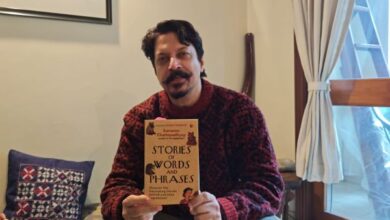Tarun Bhartiya: A legacy of art, activism, and humanity
'Tarun lived life on his terms, fought for just causes, created timeless art & built enduring friendships'

 It’s been more than a week since Tarun Bhartiya passed away because of a heart attack, but the tributes to him continue to flow. Of all the tributes paid to him, the one by Ravish Kumar was, for me, the most noteworthy. Ravish revealed that Tarun was the person who gave him his break when he first joined NDTV. He was effusive in his praise of Tarun, labelling him as someone whose editing skills were exceptional and ahead of their time. A diamond Ravish termed Tarun, calling himself fortunate to have known someone like him.
It’s been more than a week since Tarun Bhartiya passed away because of a heart attack, but the tributes to him continue to flow. Of all the tributes paid to him, the one by Ravish Kumar was, for me, the most noteworthy. Ravish revealed that Tarun was the person who gave him his break when he first joined NDTV. He was effusive in his praise of Tarun, labelling him as someone whose editing skills were exceptional and ahead of their time. A diamond Ravish termed Tarun, calling himself fortunate to have known someone like him.
Ravish himself is a prominent figure in the Indian news landscape, having amassed over 12 million followers on his YouTube channel, which he launched after leaving NDTV. In his new book ‘2024: The Election that Surprised India’, Rajdeep Sardesai, a well-known news anchor at India Today has devoted a couple of pages to Ravish and how his news activism had a role to play in the recent parliamentary election. To have someone like Ravish who has had an oversized impact on the national political landscape praise Tarun in the way he did was a tribute few would be fortunate to receive.
Tarun himself had always been a champion of progressive causes, and this journey began a very long time ago. In another tribute, eminent Assamese sociologist Sanjay Borbora revealed that after the Babri Masjid’s demolition, Tarun left his hostel for Ayodhya. There, he volunteered as a peace activist and stayed at the local office of the Communist Party of India.
A harsh critic of Hindutva politics, he was one of the many artists who returned their national awards in 2015 to protest against the atrocities being committed against the minorities and dissenters of the government. One can go through the letter he wrote to the President of India and find not only the mention of Babri Masjid but also of the resistance of the indigenous peoples of Meghalaya against attempts to mine uranium by the Union Government. In that letter, he mentions Kong Spelity Lyngdoh Langrin, who refused millions of rupees offered by UCIL to lease her land for mining. She did this after experiencing the radio-active pollution created by test mining in the village. If there’s a person who should embody the determination of indigenous peoples to maintain autonomy over their ancestral territory which existed before the old kingdoms and the new nations that have emerged in South Asia, it will be Kong Spelity Lyngdoh Langrin.
Tarun was not only recording stories of resistance but also actively leading the vanguard in the fight. Thma U Rangli-Juki (TUR) was a collective that he, Angela Rangad (his wife) and others created to articulate issues of the working class. Many times, these issues get subsumed by the jaidbynriew politics, which is essentially a Khasi version of the BJP’s Hindutva politics. I became part of TUR when I was still teaching at the University and the first ever protest I took part in was the Beef Party that it organised to greet Amit Shah in his visit to Shillong. Thereafter, TUR organised the street vendors, and the MeECL (Meghalaya Energy Corporation Limited) workers, among others.
A couple of years ago, the street vendors won an important battle when the Government of Meghalaya implemented the Central Act, which had been the demand of Meghalaya’s Progressive Street Vendors Association for the last nine years.
Last year, the MeECL workers also won an important victory when the Meghalaya High Court directed the Meghalaya Energy Corporation Limited (MeECL) to pay casual and contractual employees of Grade-III and IV posts with equal pay for equal work and with minimum pay scale. The leadership by Tarun and Angela were instrumental in these victories, which were a momentous occasion for working-class politics in a state where identity-based jaidbynriew politics has been used to obscure and divide the working class for the benefit of the few.
The emergence of working-class politics in the state, in its nascent form, has been made possible through the efforts and personal risks taken by Tarun and Angela. They created the platform through TUR and Raiot (an online webzine) which helped those of us who also believe in similar politics to express our thoughts and take part in the movements that one day might create a space for a progressive alternative.
Tarun was also the critical link that connected the politics on the ground with working-class movements at the national level. For one meeting of the Workers Power Union (an amalgamation of workers’ unions supported by TUR), he got well-known trade unionist, activist and lawyer Sudha Bharadwaj to conduct the training program.
Bharadwaj was among the activists, lawyers and academics arrested on August 28, 2018, under UAPA in the controversial Bhima Koregaon. A special NIA court later granted her bail. The same case led to the arrest of Stan Swamy, an Indian Catholic priest and indigenous tribal rights activist, who died in 2021 from health complications while incarcerated.
Last year, Arundhati Roy, the Booker Prize winner and political activist, had visited Shillong and stayed at Tarun and Angela’s place. If there’s a progressive cause in the country, Tarun would most certainly know about it and the people who are involved in it. His loss is a loss of all these invaluable connections that working-class politics in Meghalaya needs to grow and prosper.
Beyond his activism, Tarun was an exceptional artist. He received multiple national and international awards for his documentaries, two of which were significant in capturing the life world and landscape of the indigenous Khasis.
In his documentary, Kings Have Resorts People Have Songs, he depicted the millet festival of Long Hai, a song not sung in Syndai (a War Khasi village in West Jaintia Hills) for 65 years. The award-winning The Brief Life of Insects highlighted the improvisational essence of folk music as farmers in Umpohwin, a Bhoi Khasi village on the Assam-Meghalaya border, constructed songs which they sang while threshing paddy.
Tarun had also become recently interested in photography, which was part of his evolution as an artist who always wanted to observe and reveal hidden truths through his work. His photographs, mostly black and white, evoke a thirst for the story behind those captured moments. The last time I met him was in Fire Brigade, where he was standing on the footpath near the junction clicking pictures. I don’t think that he was doing it for a project, but he was just documenting a part of the city and the people he deeply loved.
What distinguished Tarun from his peers were not only his technical skills but also his deep sense of humanity, enriched by his voracious reading. You talk about anything to Tarun and most probably he will have an opinion about it. Many times people pretend to know a subject but dig deep enough and you realise it’s shallow and muddled. That was not the case with Tarun, who could engage with you at a level where you don’t feel that you are wasting your time. People who were paying their tribute to him during his funeral service also mentioned the vast knowledge that he had imbibed. It was that vast repository that he had built up, combined with his mastery over his craft, making documentary films or taking pictures, which set him at a level above many of his peers.
Tarun and Angela asked me last year if I was looking to move abroad for further studies or a job. I told them I had no intention of leaving Shillong and eventually “I am going to die here”. Tarun was thrilled at my response and exclaimed that there’s nothing wrong with staying where you love and spending your life among the people you care about. That conversation proved prescient; a few months later, Tarun died shortly after returning from Ahmadabad, where his work on Niam Khasi/Tre had been exhibited.
As an atheist, I cannot romanticise his death or claim that I will eventually meet him. Tarun, who also was a sceptic, would have scoffed at this fake gesture. He knew very well that this is the only life that any of us have and whatever we do in this life has no repercussions afterwards. All I can honestly say is that Tarun lived life on his terms, fought for just causes, created timeless art, and built enduring friendships — all while being a devoted husband and a doting father to his children. I bid you adieu, comrade.
Lal Salaam/Red Salute.
(The views expressed in the article are those of the authors and do not reflect in any way his affiliation to any organisation or institution)





